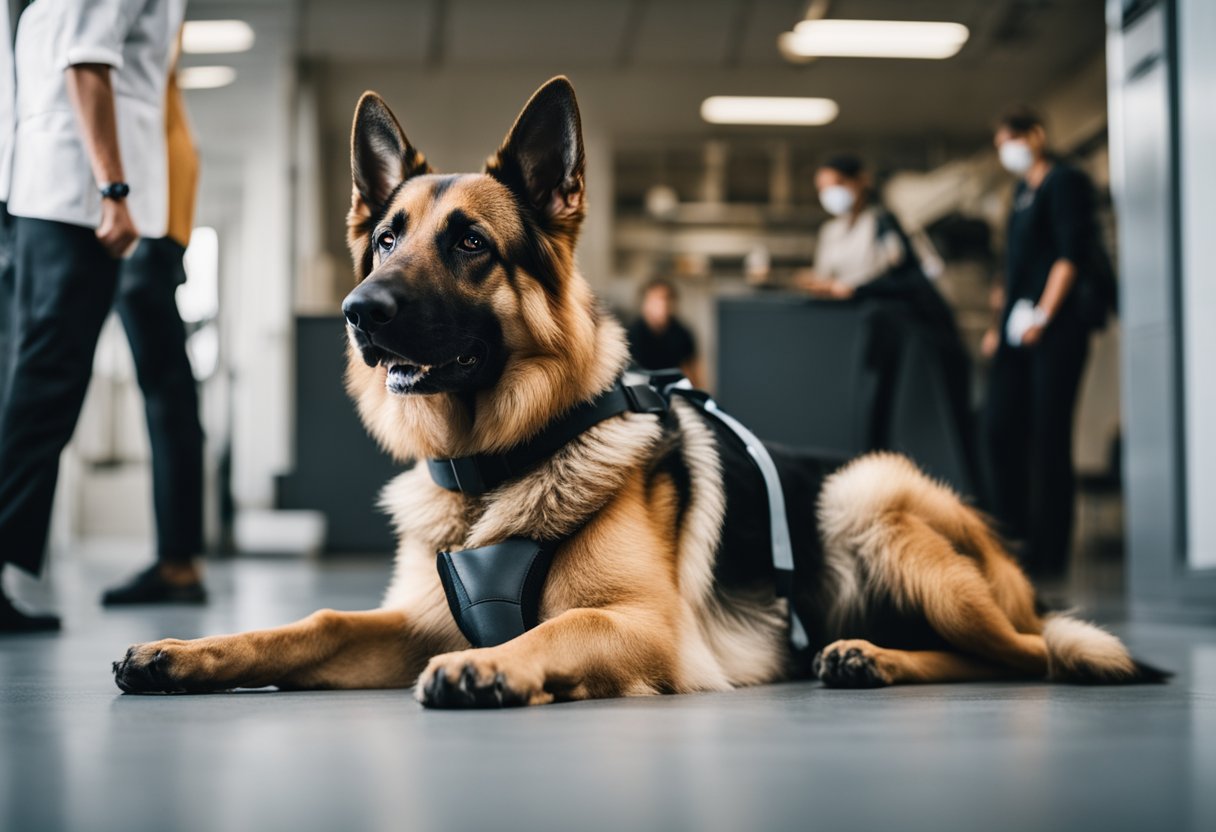Many dog breeds come with distinct traits and characteristics that appeal to potential pet owners. Certain breeds are known to have more health issues and behavioral challenges, making them more prone to specific problems over time. Understanding these breeds can help prospective owners make informed decisions about pet ownership.
By identifying which breeds may require additional care and attention, individuals can prepare themselves for the responsibilities of dog ownership. Navigating the world of dog breeds involves considering factors such as genetics, predisposition to illnesses, and temperament challenges.
1) Bulldog

Bulldogs are known for their distinctive appearance and gentle disposition. Despite their friendly nature, they can be prone to several health issues.
One major concern is their breathing difficulties, often caused by their short snouts. This breed can struggle with heat and exercise due to these respiratory challenges.
Skin problems are also common among Bulldogs. They may develop infections in the skin folds, requiring regular cleaning and care.
Hip and joint issues, such as hip dysplasia, can affect Bulldogs as well. Maintaining a healthy weight is crucial to reduce stress on their joints.
Finally, Bulldogs are susceptible to certain heart conditions. Regular veterinary check-ups can help monitor their health and address any concerns promptly.
2) German Shepherd

German Shepherds are well-known for their intelligence and versatility. They are commonly used in police and military roles due to their trainability and loyalty.
Despite these positive traits, they can be prone to specific health issues. Conditions such as hip dysplasia, elbow dysplasia, and certain heart problems are more prevalent in this breed.
Behaviorally, they may exhibit protective tendencies, leading to potential aggression if not properly socialized. Early and consistent training is essential to develop a balanced temperament.
Grooming needs include regular brushing, as they shed quite a bit. This helps manage hair around the home and maintains coat health.
Their energy levels are high, requiring plenty of exercise and mental stimulation. Without adequate activity, they may become bored and exhibit destructive behaviors.
3) Golden Retriever

Golden Retrievers are well-known for their friendly and gentle temperament. Despite their popularity, they can face several health issues that potential owners should be aware of.
Common problems include hip dysplasia, which can lead to arthritis later in life. They are also prone to certain heart conditions, such as dilated cardiomyopathy.
Golden Retrievers may experience skin allergies and ear infections, particularly if their coats are not properly maintained. Regular grooming can help minimize these issues.
Additionally, they are susceptible to certain cancers, including hemangiosarcoma and lymphosarcoma. Early detection and regular veterinary check-ups are crucial for managing health concerns in this breed.
4) Beagle

The Beagle is a friendly and curious breed known for its keen sense of smell. This breed often falls prey to various health issues, requiring attentive care from owners.
Common problems include hip dysplasia, ear infections, and obesity. Their long ears can trap moisture, leading to infections if not properly maintained.
Beagles are also prone to skin conditions and eye issues, such as cataracts. Regular veterinary check-ups can help catch these problems early.
Due to their hunting background, Beagles have a strong prey drive. This can lead to behavioral issues if not appropriately managed, including a tendency to wander off.
Proper training and socialization are important for Beagle owners to instill good behavior. Their intelligence and stubbornness can make training a challenge, requiring consistency and patience.
5) Boxer

Boxers are known for their playful and energetic nature. They often require a significant amount of exercise and mental stimulation to stay happy. Without enough activity, they may develop behavioral issues.
Health problems can be common in Boxers. They are prone to certain conditions, including heart problems and hip dysplasia. Regular veterinary check-ups are essential to catch any issues early.
Boxers can be protective and loyal, making them great family pets. They often bond closely with children, but their high energy levels can sometimes lead to accidental injuries during play. Proper training and socialization are crucial for them to develop good behavior.
Owners should be prepared for a commitment to training and exercise. Early socialization helps in reducing aggression or anxiety. With the right approach, Boxers can be friendly and well-adjusted companions.
6) Dachshund

Dachshunds, often referred to as “wiener dogs,” are known for their distinctive long bodies and short legs. Their physical structure predisposes them to specific health issues, particularly related to the spine.
Intervertebral disc disease is common in this breed. The elongated spine can lead to severe pain and mobility issues. Preventative care is essential to minimize risks.
Dachshunds can also exhibit behavioral challenges, including stubbornness and separation anxiety. Early training and socialization can help mitigate these tendencies.
Additionally, they have a tendency to bark, which may lead to nuisance barking if not properly managed. Consistent training can reduce excessive vocalization.
Diet and exercise are critical for their well-being. Maintaining a healthy weight is vital to avoid additional strain on their joints and spine. Regular vet checkups can assist in managing health issues effectively.
7) Pomeranian

Pomeranians are small, fluffy dogs known for their lively personalities. They often display confidence and curiosity, making them popular companions.
Health issues can arise in Pomeranians, particularly relating to their teeth and eyes. Dental problems are common due to their small mouths, leading to tooth decay if not properly cared for.
Additionally, Pomeranians can suffer from patellar luxation, where the kneecap dislocates. This condition may require surgical intervention in severe cases.
Their dense double coat requires regular grooming to prevent matting. Failure to maintain their fur can lead to skin irritations and other related health issues.
Socialization is crucial for Pomeranians. Without proper exposure to various environments and people, they may develop anxiety or aggression.
Despite their challenges, Pomeranians can thrive in loving homes with proper care and attention. Potential owners should be aware of these traits and ready to manage them accordingly.
8) Chihuahua

Chihuahuas are small dogs known for their lively personalities. Despite their size, they can exhibit strong-willed behavior.
They are often protective, which can lead to barking and aggression if not properly socialized. Early and consistent training is essential for a balanced temperament.
Health issues in Chihuahuas include dental problems and heart conditions. Their small size also makes them susceptible to injuries.
Chihuahuas thrive on companionship but can develop separation anxiety if left alone for long periods. They require regular exercise to stay healthy and happy.
This breed often forms strong bonds with their owners but may be wary of strangers. Proper socialization can help mitigate this behavior.
9) Yorkshire Terrier

The Yorkshire Terrier, often called the Yorkie, is a small breed known for its lively personality and beautiful coat. They typically weigh around 4 to 7 pounds, making them suitable for apartment living.
Despite their compact size, Yorkies can present several health issues. Common problems include dental concerns, which stem from their small jaws, and patellar luxation, where the kneecap slips out of place.
Yorkies are also prone to certain skin conditions, such as allergies. Their long hair requires regular grooming to prevent matting and skin irritation.
Additionally, they may display behavioral challenges like separation anxiety. Early socialization and training are essential to help them adapt and thrive in various environments.
10) Great Dane

Great Danes are known for their imposing size and gentle nature. Despite their friendly demeanor, they are prone to certain health issues.
One common concern is hip dysplasia, which can lead to mobility problems. This condition is prevalent in large breeds, including Great Danes.
Bloating is another significant risk. It can occur suddenly and requires immediate veterinary attention. Great Danes are often affected due to their deep chests.
Heart issues also pose a risk, particularly dilated cardiomyopathy. This condition can affect their overall lifespan.
Additionally, this breed can face skin problems, such as allergies and infections. Regular grooming and monitoring can help manage these skin issues.
Great Danes need a balanced diet to avoid obesity. Weight management is crucial for keeping them healthy and minimizing stress on their joints.
Due to their size, proper training and socialization from a young age are essential. This can help mitigate behavioral problems, contributing to a well-adjusted companion.
Understanding Dog Breed Health Challenges

Certain dog breeds are more susceptible to health issues due to various factors. Genetics and anatomy significantly influence the prevalence of these challenges, making it important for prospective owners to be aware of these factors.
Common Health Issues in Dogs
Numerous health issues can affect dogs regardless of breed, but some conditions are more prevalent in specific breeds. Key issues include:
- Hip Dysplasia: A common genetic condition in larger breeds, leading to arthritis or mobility problems.
- Brachycephalic Airway Syndrome: Affects breeds with short muzzles, like Bulldogs and Pugs, causing breathing difficulties.
- Skin Allergies: Breeds such as Labrador Retrievers often experience skin issues due to food, pollen, or other allergens.
- Ear Infections: Breeds with long, floppy ears, such as Cocker Spaniels, are prone to ear infections due to moisture retention.
Awareness of these potential issues can help in early diagnosis and treatment.
Genetic Predispositions
Genetic factors play a crucial role in the health of dog breeds. Certain breeds are prone to inherited conditions:
- Doberman Pinschers: Susceptible to dilated cardiomyopathy, a heart condition.
- Great Danes: Prone to gastric torsion, a life-threatening issue due to rapid stomach twisting.
- Cockapoos: May inherit eye conditions such as cataracts from either parent breed.
- Boxers: At risk for specific tumors and heart issues.
Genetic predispositions highlight the importance of responsible breeding practices to minimize health risks. Understanding these factors can aid owners in better care.
Prevention and Care Tips

Proper care and preventive measures can significantly reduce the risk of health issues in prone dog breeds. Regular veterinary visits and a balanced lifestyle are paramount for ensuring a dog’s well-being.
Regular Veterinary Check-Ups
Regular veterinary visits are crucial for any dog, especially breeds that are more prone to health issues. These check-ups allow for early detection and management of potential problems.
Key components of veterinary care include:
- Vaccinations: Keep vaccinations up-to-date to prevent common diseases.
- Dental Care: Regular dental check-ups can prevent dental disease, which is prevalent in certain breeds.
- Parasite Control: Routine treatments for fleas, ticks, and worms are essential.
- Health Screenings: Specific tests can reveal underlying conditions before they become serious.
A veterinarian can provide a tailored health plan based on the dog’s breed, age, and health history.
Balanced Diet and Exercise
A balanced diet and regular exercise play a vital role in maintaining a dog’s health. Proper nutrition supports growth and can prevent obesity, reducing strain on joints and organs.
Important dietary considerations:
- High-Quality Food: Choose dog food that meets AAFCO standards for nutritional adequacy.
- Portion Control: Follow feeding guidelines based on the dog’s weight and activity level to avoid overfeeding.
- Hydration: Ensure fresh water is available at all times.
In addition to diet, regular exercise is essential.
Exercise tips include:
- Daily Walks: Aim for at least 30 minutes of physical activity for most breeds.
- Playtime: Engaging in interactive play helps stimulate mental and physical health.
- Training Sessions: Regular training not only reinforces good behavior but also provides mental stimulation.
Maintaining a balanced routine can contribute to a longer, healthier life for prone breeds.



